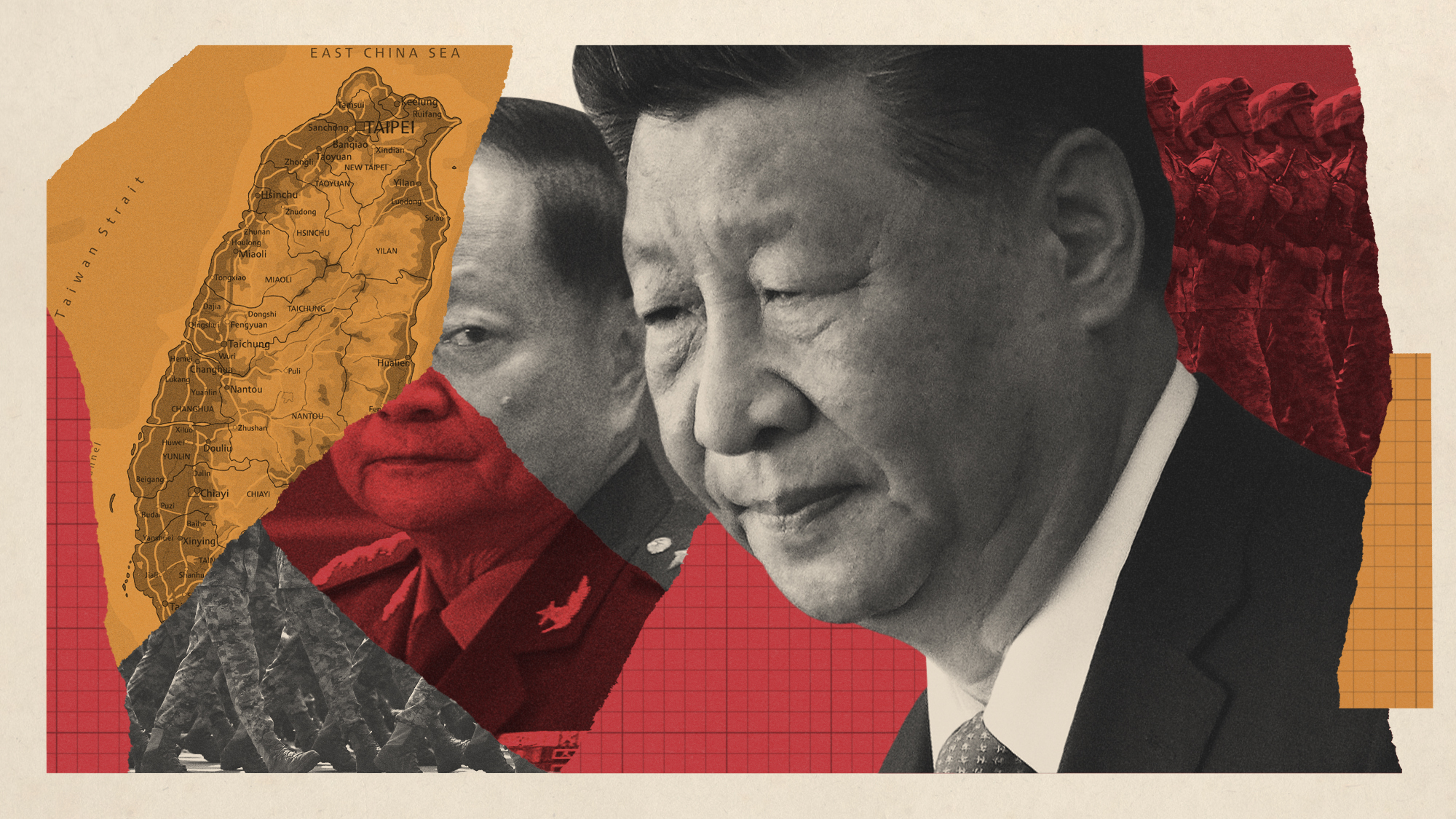The collective religious experience of #MeToo
All around us, women and men are engaging in behavior that is intensely religious, and specifically Christian, in character


A free daily email with the biggest news stories of the day – and the best features from TheWeek.com
You are now subscribed
Your newsletter sign-up was successful
If even a portion of the allegations made against Harvey Weinstein are true, the man is a thoroughgoing predatory sleazebag. The same can be said of Bill O'Reilly, Roger Ailes, Bill Cosby, Bill Clinton, and, yes, President Trump.
This should be obvious to all. But sadly, outrageously, it isn't — as we know all too well from the complacency of those who were aware of the alleged abusive behavior of these powerful men down through the decades and did or said nothing to stop it. That the era of the pathologically entitled, institutionally facilitated sexual predator may be drawing to a close is something every American should applaud.
But that doesn't mean we should be untroubled by the way the reaction to the Weinstein revelations is unfolding in American culture.
The Week
Escape your echo chamber. Get the facts behind the news, plus analysis from multiple perspectives.

Sign up for The Week's Free Newsletters
From our morning news briefing to a weekly Good News Newsletter, get the best of The Week delivered directly to your inbox.
From our morning news briefing to a weekly Good News Newsletter, get the best of The Week delivered directly to your inbox.
Conservatives often describe liberalism as a secular faith that stands in for the comprehensiveness of traditional religious piety in the lives of liberal men and women. I usually scoff at the suggestion, since it seems at one and the same time to bowdlerize the seriousness of authentic religious belief and the sobriety of properly liberal politics.
Yet in this case, the parallel is fitting. All around us, on social media and op-ed pages, women and men are engaging in behavior that is intensely religious, and specifically Christian, in character.
In many respects, this is nothing new. The tendency has been gathering force on the left for years. Mark Lilla describes it well in his controversial book The Once and Future Liberal, noting how from time to time Americans undergo religious Great Awakenings. When they gather force,
surges of fevered fanaticism come over us, all sense of proportion is lost, and everything seems of an unbearable moral urgency. Repent, America, repent now! The country is undergoing such an Awakening now concerning race and gender, which is why the rhetoric being generated sounds evangelical rather than political. That one now hears the word woke everywhere is a dead giveaway that spiritual conversion, not political agreement, is the demand ... [All of this has] precedents in American revivalist religion. [The Once and Future Liberal]
Indeed it does. And the national (and even international) stage provided by social media has only encouraged its proliferation and intensification. Public denunciation and calls for atonement are no longer confined to a tent pitched in a specific place holding a few hundred or a thousand people. Now the awakening can cascade to all of one's friends or followers spread across the country and the planet, each of whom can share or retweet to all of their friends and followers in turn, producing a viral revival capable of reaching anyone in the world who has access to the internet and possesses the ability to grasp the cultural and linguistic import of the meme.
A free daily email with the biggest news stories of the day – and the best features from TheWeek.com
That's exactly what we've seen with the #MeToo hashtag, which was started by actress Alyssa Milano to encourage women to share their experiences of sexual harassment and assault. The model from the start was group therapy, with the session conducted not in the classroom of an elementary school or in a church basement meeting hall with a few dozen people but online in front of a potential audience of countless millions.
Group therapy has always had deep links to public religious expression, as people take turns giving testimony and offering confessions in return for the promise of unconditional acceptance and love. The religious aspect of the ritual is only enhanced when it gets amplified through the megaphone of social media.
This is especially so in the case of the post-Weinstein debate, with men also getting in on the act. Now the display is not simply about victims of abuse sharing and publicizing their experiences for the sake of healing and inspiring change for the better. It's also about those who perpetrate, facilitate, and turn a blind eye to the abuse confessing their own sins, testifying to their transgressions, humbly requesting absolution and redemption, and begging for readmission to the community on the condition of abject self-abasement and repentance.
Billy Graham would have smiled.
I'm perfectly capable of feeling and expressing intense shame and disgust about male behavior. But #MeToo is something different — something at once emotionally exhibitionist and voyeuristic, a public ritual with an outwardly religious form but lacking any spiritually or theologically sustaining core. The result is an unsettling synthesis of preening self-regard and self-pity, showoffy virtue signaling and smarmy bad faith.
Consider the small but exemplary case of the "pledge" written by a male friend of activist Amy Siskind. He posted it on her Facebook page, and she tweeted it out on Tuesday morning. It has since been retweeted by thousands of people, most of them men, along with the hashtag #WithYou.
Most of the pledge is admirable — and, I'm quite sure for most of the men endorsing it, close to second nature. (In such displays, there is always a fine line between the sincere expression of support and a needy clamoring for approval.) But then there are the gratuitous and oddly puritanical flourishes — the calls for men never to attend strip clubs, never to "watch or defend" pornography that engages in "degradation," never to "tell women to smile" or "comment on the appearance of women."
On the one hand, don't coerce women into sex. On the other, don't tell them they look pretty. Got it.
All of it culminates in a solemn vow: "If I have done any of these things in the past, to make reparations to the women I have harmed, and to commit myself to being a safe ally." Repent, be born again, rid yourself of impure thoughts and actions — only then will you be forgiven for your sins.
None of this has anything to do with politics. It’s a moral and religious crusade that precisely parallels those of earlier, more observant times. Triggered by the flood of provocations and sordid revelations that mark the Trump era, liberals have recoiled in the direction of pious proclamations, setting off to convert the country and the world to the Gospel of Egalitarianism.
Damon Linker is a senior correspondent at TheWeek.com. He is also a former contributing editor at The New Republic and the author of The Theocons and The Religious Test.
-
 ‘Various international actors hope to influence the result for their own benefit’
‘Various international actors hope to influence the result for their own benefit’Instant Opinion Opinion, comment and editorials of the day
-
 What do Xi’s military purges mean for Taiwan?
What do Xi’s military purges mean for Taiwan?Today’s Big Question Analysts say China’s leader is still focused on reunification
-
 Magazine solutions - February 13, 2026
Magazine solutions - February 13, 2026Puzzle and Quizzes Magazine solutions - February 13, 2026
-
 The billionaires’ wealth tax: a catastrophe for California?
The billionaires’ wealth tax: a catastrophe for California?Talking Point Peter Thiel and Larry Page preparing to change state residency
-
 Bari Weiss’ ‘60 Minutes’ scandal is about more than one report
Bari Weiss’ ‘60 Minutes’ scandal is about more than one reportIN THE SPOTLIGHT By blocking an approved segment on a controversial prison holding US deportees in El Salvador, the editor-in-chief of CBS News has become the main story
-
 Has Zohran Mamdani shown the Democrats how to win again?
Has Zohran Mamdani shown the Democrats how to win again?Today’s Big Question New York City mayoral election touted as victory for left-wing populists but moderate centrist wins elsewhere present more complex path for Democratic Party
-
 Millions turn out for anti-Trump ‘No Kings’ rallies
Millions turn out for anti-Trump ‘No Kings’ ralliesSpeed Read An estimated 7 million people participated, 2 million more than at the first ‘No Kings’ protest in June
-
 Ghislaine Maxwell: angling for a Trump pardon
Ghislaine Maxwell: angling for a Trump pardonTalking Point Convicted sex trafficker's testimony could shed new light on president's links to Jeffrey Epstein
-
 The last words and final moments of 40 presidents
The last words and final moments of 40 presidentsThe Explainer Some are eloquent quotes worthy of the holders of the highest office in the nation, and others... aren't
-
 The JFK files: the truth at last?
The JFK files: the truth at last?In The Spotlight More than 64,000 previously classified documents relating the 1963 assassination of John F. Kennedy have been released by the Trump administration
-
 'Seriously, not literally': how should the world take Donald Trump?
'Seriously, not literally': how should the world take Donald Trump?Today's big question White House rhetoric and reality look likely to become increasingly blurred
